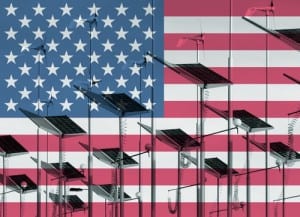About 10 minutes after Donald Trump gave his acceptance speech for his remarkable election as US president, I was invited into the driver’s cockpit of the very fast train travelling from Madrid to Zaragoza, in Spain.

It was a remarkable vision – hurtling at 300kms/hour through a thick fog, barely able to distinguish what lies ahead. The world may be having a similar sensation as it tries to make sense of a Trump presidency and anticipate what happens next.
The reality is that we simply don’t know. As one observer put it yesterday, the media and the others who got everything so wrong will now try to tell us all the things that will happen as a result of all the things they said would not happen.
Nevertheless, it doesn’t look good. And on any conventional assessment, it is a disaster on many levels – particularly for the efforts to address climate change and for the clean energy industry in the US.
Trump is convinced that climate change is a hoax, most likely propagated by the Chinese. He has mocked the idea of a carbon price, vowed to pull the US out of the Paris climate deal and pull down clean energy policies, and promised to “save” the coal industry and allow a free-for-all for oil and gas drillers.

He will likely appoint a leading climate denier, Myron Ebell, to head the Environmental Protection Agency and transition the body out of existence. His first appointment to the Supreme Court will almost certainly be of a judge sympathetic to the fossil fuel industry.
But as experts such as Alden Meyer, from the Union of Concerned Scientists, point out, Trump can’t change physics. Climate change is still happening. It was hard enough to deal with that with a supportive US on board. Without it, the rest of the world will need to redouble its efforts.
The Conservative Turnbull government – which today finally added Australia to the list of countries that have ratified the Paris climate deal – still has no real policy strategy on how it will meet its targets, and could well take the lead of the Trump administration on future ambition, in much the same way it did when George Bush was in power. Frankly, though, that scenario represents no detour from its current trajectory.
That leaves Australia equally vulnerable to the future economic shocks that will be the fate of the US if it eschews the transition before it. Barack Obama identified the risks to the US economy if other countries gained the upper hand on clean energy technologies – given the size of the seismic economic and geopolitical shifts that are inevitable in such a profound transition.
Australia still seems blind to those risks, even if business is now starting to wake up to the realities of wind and solar. And that takes us to another crucial point – if Trump cannot change the laws of physics, neither can he halt the change in technology.
The energy transition to cheaper and cleaner energy is happening, regardless. Trump can slow down the pace in the US, but it will accelerate elsewhere, leaving the US at a significant disadvantage; although it should be noted that US renewable investments are driven to a large extent by state-based targets.
HSBC has noted that Trump’s policies put at risk the decarbonisation and clean energy uptake seen during President Obama’s time in office, with potential to slow both the US energy system transition and domestic measures to mitigate climate change.
But at the same time Trump has no control over the solar market, which is heading towards 2c/kWh, and he has no influence over battery storage, which is heading to below 400/kWh and to its major inflexion point.
This is a crucial point. Wind and solar and their enabling technologies are getting cheaper with or without the Americans, and the fossil industry will be disrupted.
The brand of populism pedaled by the likes of Trump and Australia’s Pauline Hanson has no room for facts, because they have no political capital, and rely on nostalgia and attacking the establishment.
So the incumbent energy oligarchs have no reason for complacency or satisfaction from this result. Brexit and Trump show the appetite for disruption, and falling technology costs deliver the means for it on an unprecedented scale in the energy industry – the sector which has wielded enormous political and economic power in the last few decades.










